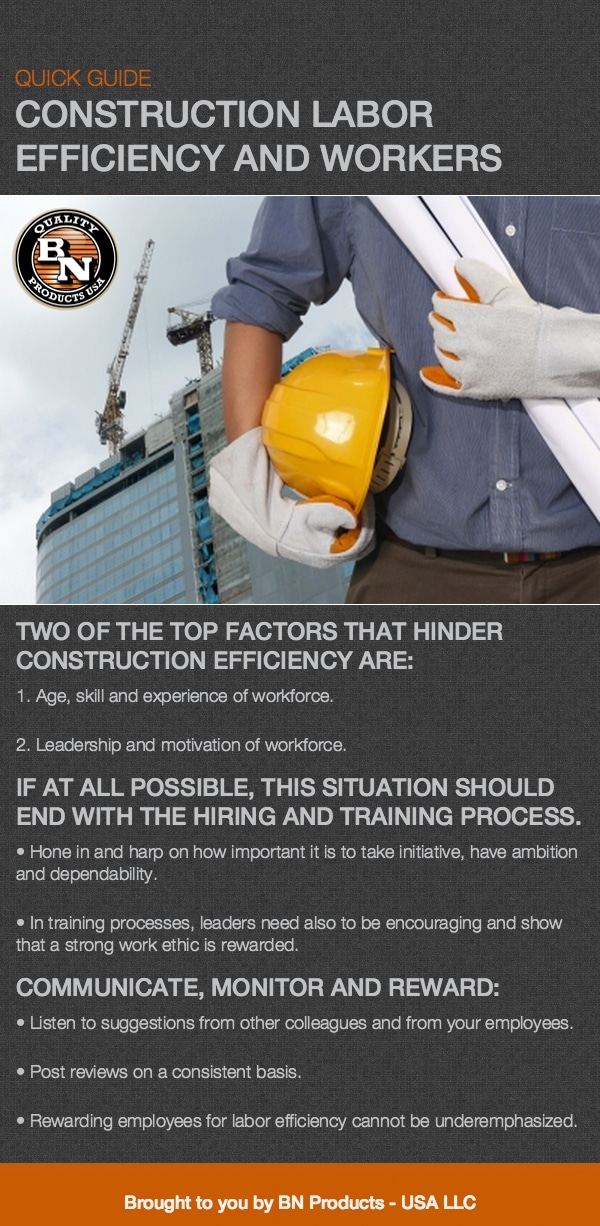Construction labor efficiency is based around many factors. Constantly focusing on new ways to maximize revenue and produce resources, maintaining high equipment standards and utilizing technology are all important focuses. It is equally important to hire workers with a strong work ethic, workers who believe in following high standards, safety procedures and the authority of construction and project managers. It is the work of people – from leaders to contractors to construction workers – that comprise the most important factor regarding efficiency during a construction project.
Increasing labor production and productivity has many advantages. First off, projects are completed at a quicker pace. Labor costs are lowered and contractors have more time to submit bids. The project can generally be more profitable, and upper management is pleased with results. So why do studies show that workers in a construction project are unproductive 50% of the time?
Two of the top factors that hinder construction efficiency are:
- Age, skill and experience of workforce.
- Leadership and motivation of workforce.
Many workers on a construction project spend much of their time waiting for results. Other factors that lead to a lack of productivity involve cleaning, wasting materials and poor management.
If at all possible, this situation should end with the hiring and training process.
In order to improve labor efficiency, during the hiring process, construction managers need to hone in and harp on how important it is to take initiative, have ambition and dependability, work hard and have teamwork. Find construction workers who celebrate and believe in these ideals. Show that your team does not tolerate a lack of work ethic. Display and explain to candidates and employees that hard work produces value, success, more jobs and job security – all of which benefit everyone.
Construction and project managers should analyze the different situations that hinder productivity, and what they can do as supervisors to eliminate these situations. 1/3 of project delays are not even correlated with management. By improving management practices, a company can improve efficiency while decreasing waiting periods. Get rid of factors involving inefficiency, such as poor planning, misuse of equipment, a lack of materials, etc. By understanding why some projects were more successful than others, measurements can be put into place to understand the missing factor.
Better planning involves ordering materials in plenty of time, implementing benchmarks for improvement and setting reachable, realistic goals for all members of the project to reach – especially by a designated time.
Drug screening can also be done initially and regularly. Construct plans that revolve around training not just workers, but supervisors and managers, who will then also pass on to employees they oversee an unfailing ideal of labor efficiency. It is important to immediately instill in all members of the staff and project that the best situation for everyone is to utilize time wisely, to take pride in the job and to get done what needs to be done in a dependable fashion.
In training processes, leaders need to also be encouraging and show that a strong work ethic is rewarded. Train all supervisors and employees how to efficiently use certain machines, how to prepare a job site in the most economical fashion, and how to reach the deadlines you have set for them. Productivity coaching should also emphasize that productive jobs are also the safest, high quality jobs. No one wants accidents. No one wants to be delayed or discouraged by do-overs. Lead by example. Motivate. Reward, and take pride in your job. Others will follow.
Communicate, Monitor and Reward:
When a project begins, an essential part of the process should be listening to suggestions from other colleagues and from your employees. Answering questions will help make sure there is no confusion about how something works or how quickly it needs to get done. Reviews are essential to follow through with during a job. Post reviews on a consistent basis, and have all supervisors give you their own consistent audits. This is a part of making sure that you are checking in on all parts of the job site and having supervisors do the same.
A part of these check-ins involve asking your own questions of employees. If they are not seeking your help, ask to make sure there is no confusion or problem which they are not trying to remedy. Try to seek out problems before they happen. Monitor usage of all machines, establishing rules that it is always important and truly efficient to use construction tools and equipment, such as a portable cutting edge saw or a heavy-duty rebar bender, properly and with care. Also, establish your authority (and have your supervisors establish theirs, as well) so that workers not only to feel that you care, but that you are aware of every part of the process.
Rewarding employees for labor efficiency cannot be underemphasized. Even seemingly small rewards such as a site wide lunch are worthwhile. Good reviews, more hours, recommendations to join other jobs – these are all bonuses that display to workers that you appreciate exactly how much and how hard they work. Chances are, your employees are working long, arduous hours. Not only do you want to utilize their time and talents to the fullest, but you want to make sure they are, too. Employees should understand that being lazy, or unproductive, or sloppy at a job is not going to produce personal satisfaction. Staying at a job site, working a full day and accomplishing projects is a way to reap personal contentment for a job well done. Many people forget this, and that is why examples and rewards generate hard work and results.





